Recombinant Human Angiotensinogen / SerpinA8 / AGT Protein (His tag)
Angiotensinogen, also known as AGT and SerpinA8, is a member of the serpin family. It is an α-2-globulin that is produced constitutively and released into the circulation mainly by the liver. Angiotensinogen is a essential component of the renin-angiotensin system (RAS) and a potent regulator of blood pressure. Angiotensinogen can be schematically considered to consist of a combination of an angiotensin I (Ang I) function, located at the N-terminal end, and the presence of a serpin (serine protease inhibitor) structure at the opposite end. Angiotensinogen is cleaved into three chains: Angiotensin-1 (Ang I), Angiotensin-2 (Ang II), and Angiotensin-3 (Ang III). Angiotensin-1 is a substrate of ACE (angiotensin converting enzyme) that removes a dipeptide to yield the physiologically active peptide angiotensin-2. Angiotensin-1 and angiotensin-2 can be further processed to generate angiotensin-3, angiotensin-4. Angiotensin 1-7 is cleaved from angiotensin-2 by ACE2. Angiotensin-2 acts directly on vascular smooth muscle as a potent vasoconstrictor, affects cardiac contractility and heart rate through its action on the sympathetic nervous system. Defects in AGT are associated with susceptibility to essential hypertension and renal tubular dysgenesis (RTD). Several serpins (antithrombin, maspin, pigment epithelial-derived factor, and kallistatin) have been recently shown to exert an antiangiogenic activity, suggesting a common mechanism of endothelial cell proliferation and migration. Angiotensinogen/AGT and its renin-cleaved product, des(Ang I)AGT, are also angiogenesis inhibitors, both in vitro and in vivo at concentrations within the range of those observed in plasma. The Angiotensinogen products, that is angiotensin II and possibly angiotensin II-related products, have been found to act locally in modulating adipose tissue growth in an autocrine/paracrine manner. The transient or chronic overexpression of angiotensinogen in adipose tissue favors lipogenesis in adipocytes and leads to a ‘vicious’ circle whereby adipose tissue development is further increased.
Synonym(s) : ANHU , FLJ92595 , FLJ97926 , SERPINA8
Species(s) : Human
Protein Expression Host : Human Cells
Protein Construction : A DNA sequence encoding the human angiotensinogen (NP_000020.1) (Met 1-Ala 485) was fused with a polyhistidine tag at the C-terminus.
Predicted N-terminal amino acid : Asp 34
Molecular weight/mass : The recombinant human angiotensinogen comprises 463 amino acids and has a calculated molecular mass of 51.2 kDa. As a result of glycosylation, the apparent molecular mass of rh angiotensinogen is approximately 55-60 kDa in SDS-PAGE under reducing conditions.
Protein Construction : A DNA sequence encoding the human angiotensinogen (NP_000020.1) (Met 1-Ala 485) was fused with a polyhistidine tag at the C-terminus.
Formulation : Lyophilized from sterile PBS, pH 7.4
Purity : > 98 % as determined by SDS-PAGE
Endotoxin level : < 1.0 EU per μg of the protein as determined by the LAL method
Stability : Samples are stable for up to twelve months from date of receipt at -70°C
Shipping conditions : In general, recombinant proteins are provided as lyophilized powder which are shipped at ambient temperature.Bulk packages of recombinant proteins are provided as frozen liquid. They are shipped out with blue ice unless customers require otherwise.
Reconstitution : Please refer to the printed manual for detailed information.
Additional information
| Format | 10 ug, 20 ug |
|---|---|
| Species | Human |
Ask a question about Human Angiotensinogen / SerpinA8 / AGT Protein (His tag) – PKSH031317
You must be logged in to post a review.


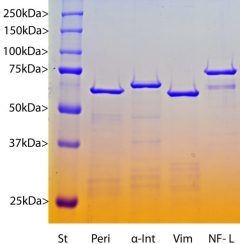
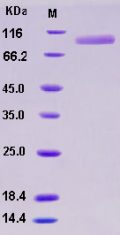
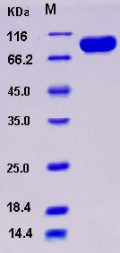
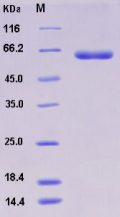
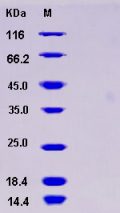
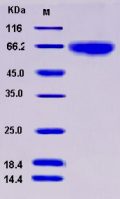
Reviews